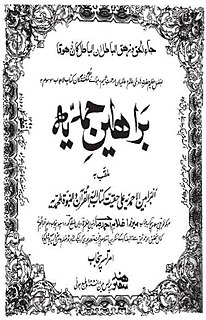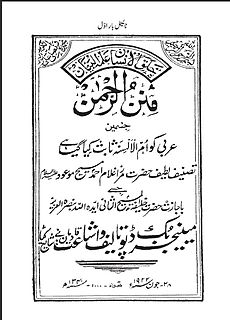 W
WAl-Muhannad 'ala al-Mufannad, also known as al-Tasdiqat li-Daf' al-Talbisat, was subsequently published in Urdu as 'Aqa'id 'Ulama' Ahl al-Sunna Deoband is a book that expresses some of the beliefs held by the Sunni Hanafi Deobandis. It was authored by the Indian Hanafi-Maturidi hadith scholar and Sufi master Khalil Ahmad al-Saharanpuri, who wrote a commentary on Sunan Abi Dawud, entitled Badhl al-Majhud.
 W
WAl-Risala al-Qushayriyya fi 'Ilm al-Tasawwuf, mostly known as al-Risala al-Qushayriyya, is one of the early complete manuals of the science of Sufism, written by the Shafi'i-Ash'ari scholar Abu al-Qasim al-Qushayri. It was written in 438/1045–6 and has been published in several editions and translated in various languages, including English, French, German, Persian, Turkish, and Urdu. It became the most widely disseminated handbook of Sufism in the Islamic world.
 W
Wal-Barāhīn al-Ahmadīyyah 'alā Haqīqatu KitābAllāh al-Qur'ān wa'n-Nabūwwatu al-Muhammadīyyah is a five-part book written by Mirza Ghulam Ahmad, the founder of the Ahmadiyya Movement. The first two parts were published in 1880 CE, the third volume was published in 1882, the fourth volume in 1884 and the fifth volume in 1905. In writing the book, Ghulam Ahmad sought to rejuvenate Islam by arguing for the validity of its principles and vindicating its teachings in response to Christian and Hindu polemics against Islam as well as atheistic philosophies. In this context, a significant portion of the subject matter of the book is dedicated to the defence of Islam as a whole against the criticism of Muhammad, the Qur'an and Islam that was raised in the 18th and 19th centuries predominantly by Christian missionaries and Hindu revivalists.
 W
WBlessings of Prayer (Book) [English rendering of barakatud Du‘a (Urdu)] is a book by Mirza Ghulam Ahmad, published in 1893. It was written in refutation of Sir Syed Ahmad Khan’s view that there is no such thing as the acceptance of prayer, and that prayer is no more than a form of worship. Ahmad proclaims that Allah hears and accepts the supplication of believers which are offered in humility and sincerity, and that the acceptance of prayer sets in motion its own chain of causes which culminates in the fulfillment of the objective prayed for.
 W
WThe Criterion for Religions, the English rendering of Mi‘yarul Madhahib, was written and published in 1895 by Mirza Ghulam Ahmad, founder of the Ahmadiyya Muslim Community. This English edition was published in 2007, by Islam International Publications
 W
WThe Elephant in the Dark is a book by the writer Idries Shah, based on lectures he delivered at the University of Geneva as Visiting Professor in 1972–1973. He was invited to speak on the topic of “Salvation as a total surrender to God: an attempt at dialogue between Christians and Muslims.”
 W
WThe Holy Quran with English translation and commentary is a 5 volume commentary of the Quran published in 1963 by the Ahmadiyya Muslim Community. It was prepared by a board of translators consisting of Maulvi Sher Ali, Mirza Bashir Ahmad and Malik Ghulam Farid.
 W
WFitnat al-Wahhabiyya is a booklet written by Shaykh al-Islam Ahmad Zayni Dahlan (1816/17–1886) the Grand Mufti of the Shafi'is in Mecca in the late years of the Ottoman Empire.
 W
WA Guide to Conclusive Proofs for the Principles of Belief, commonly known simply as Al-Irshad, is a major classic of Islamic theology. Its author, Al-Juwayni, was the leading theologian of his time; he was more famous for his many important treatises on the principles of law, and for having been the teacher of the great Al-Ghazali.
 W
WHaqā'iq al-Furqān is a 4 volume exegesis of the Quran compiled from the discouces and sermons of al-Hājj Mawlānā Hāfiz Hakīm Noor-ud-Din, the first Caliph of the Ahmadiyya Muslim Community. It is in Urdu. He was known for his lectures that he would give on tafsir, and studied the classical Islamic sciences. He was also a hafiz, as well as being well-versed in Hebrew and Arabic, especially classical Arabic.
 W
WVelayat-e faqih, also known as Islamic Government, is a book by the Iranian Muslim cleric, faqīh, and revolutionary Ayatollah Ruhollah Khomeini, first published in 1970, and probably the most influential document written in modern times in support of theocratic rule.
 W
WAl-'Aqida al-Tahawiyya or bayān 'ittiqād ahl al-sunnah wal jamā'ah is a popular exposition of Sunni Muslim doctrine written by the tenth-century Egyptian theologian and Hanafi jurist Abu Ja'far Ahmad at-Tahawi.
 W
WKitab al-Tawhid, is the main Sunni theological book, and the primary source of the Maturidi school of thought; written by the Hanafi scholar Abu Mansur al-Maturidi.
 W
WMa'alim fi al-Tariq, also Ma'alim fi'l-tareeq, or Milestones, first published in 1964, is a short book by Egyptian Islamist author Sayyid Qutb in which he lays out a plan and makes a call to action to re-create the Muslim world on strictly Quranic grounds, casting off what Qutb calls Jahiliyyah.
 W
WMaktoobat e Ahmad [Urdu- مکتو بات احمد; Letters of Ahmad (1878-1908) ] is a 3-volume collection of all available letters, written by Mirza Ghulam Ahmad in response to the queries and letters of his friends, companions and scholars.
 W
WArabic - the Mother of all Languages - (Book) Minan-ur-Rahman [Arabic: منن الرّحمٰن ] is a brief treatise on Philology by Mirza Ghulam Ahmad, (1835-1908) written in May 1895. Ahmad claimed that Arabic was the first language taught to man by God Himself and the Mother of all languages. He highlighted certain peculiarities of the Arabic language, which he claimed could not be found in any other language and challenged his adversaries, to refute his claim also addressing Max Muller (1823-1900) to come forward and meet the challenge.
 W
WThe Philosophy of the Teachings of Islam is an essay on Ahmadiyya Islam by Mirza Ghulam Ahmad, founder of the Ahmadiyya religious movement. The original was written in Urdu with the title Islami Usool ki Falāsifi, in order to be read at the Conference of Great Religions held at Lahore on December 26–29, 1896. It explicitly deals with the following five broad themes with detail set by the moderators of the Conference:the physical, moral, and spiritual states of man; what is the state of man after death? the object of man's life and the means of its attainment; the operation of the practical ordinances of the Law in this life and the next; sources of Divine knowledge
 W
WThe Principles of State and Government in Islam is a book written by Muhammad Asad. It was originally published in 1961 by University of California Press, and a revised edition was published in 1980 by Islamic Book Trust.
 W
WThe Reconstruction of Religious Thought in Islam is a compilation of lectures delivered by Muhammad Iqbal on Islamic philosophy and published in 1930. These lectures were delivered by Iqbal in Madras, Hyderabad, and Aligarh. The last chapter, "Is Religion Possible", was added to the book from the 1934 Oxford Edition onwards.
 W
WRevelation, Rationality, Knowledge & Truth is a book written by Mirza Tahir Ahmad, the fourth Caliph of the Ahmadiyya Muslim Community. Published in 1998, it was originally written in English and was subsequently translated into Urdu and Arabic. The book explores religious thought and the role of revelation throughout different ages of human civilization. It is a comprehensive thesis on the phenomenon of revelation in different faiths and seeks to argue for the existence of God through rationality.
 W
WTabsirat al-Adilla fi Usul al-Din: 'ala Tariqat al-Imam Abi Mansur al-Maturidi, better known as Tabsirat al-Adilla, is considered as the second most important kalam book of the Maturidite school, after Kitab al-Tawhid of al-Maturidi himself, composed by Abu al-Mu'in al-Nasafi.
 W
WTabyin Kadhib al-Muftari fima Nusiba ila al-Imam Abi al-Hasan al-Ash'ari is a polemic book with a powerful message against the detractors of Abu al-Hasan al-Ash'ari, written by the Shafi'i hadith master (hafiz) Ibn 'Asakir, who vindicated him from deviant views and claims falsely attributed to him.
 W
WTafseer-e-Kabeer is a 10 volume Urdu exegesis of the Quran written by Mirza Bashir-ud-Din Mahmud Ahmad, the second Caliph of the Ahmadiyya Muslim Community, written over a period of 20 years. It is often seen as his masterpiece.
 W
WAl-Iqtisād fī al-iʿtiqad, or The Moderation in Belief is a major theological work by Abū Ḥāmid Muḥammad ibn Muḥammad al-Ghazali. George Hourani indicated that the Iqtisad and Mizan al-amal were completed before or during Ghazali's crisis of faith. It led him to abandon his notorious post at the Niẓamiyya school in Baghdad and enter the path of Tasawwuf. In it, he offers what scholars consider as the best defence of the Ash'arite school of Islamic theology. He also expressed strong reservations about a theology based on taqlid and marked by polemics. In this book, Ghazali makes an attempt to respond to the extreme literalists and the Muʿtazilites. It is the balance between reason and revelation that led to the title of book The Moderation in Belief.
 W
W W
W